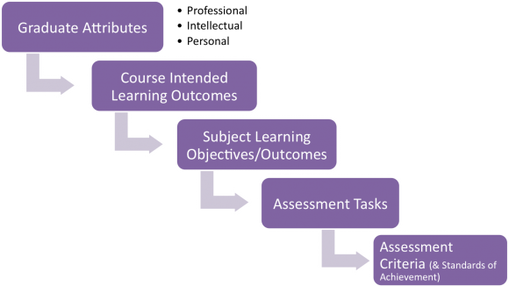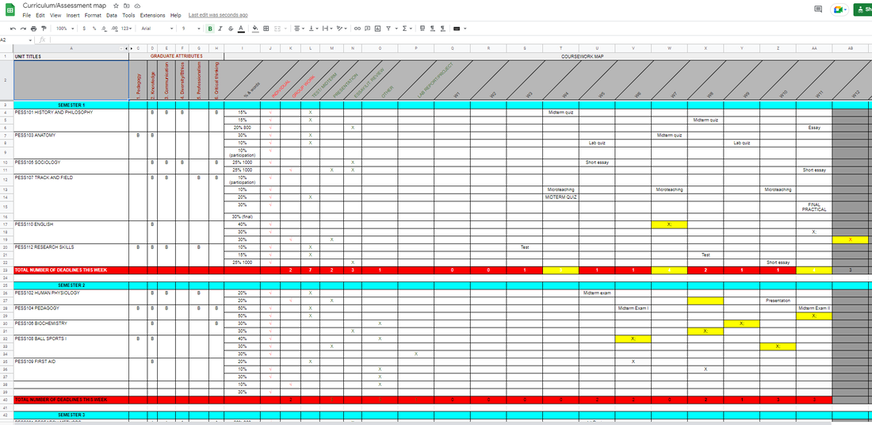2. Graduate attributes, curriculum design
& alignment with assessment
[For educational institutions]
Project description: Structure programs to ensure graduates acquire the Knowledge and develop the Skills and Abilities required in their profession. Aligning curriculum with learning outcomes and assessment.
Question: Does your program provide the qualities students need to develop to become employable in their field? What will [your program] graduates DO on a daily basis? What Knowledge, Skills, and Abilities are required in their profession?
Question: Does your program provide the qualities students need to develop to become employable in their field? What will [your program] graduates DO on a daily basis? What Knowledge, Skills, and Abilities are required in their profession?
Business case
1. Problem/need to be addressed
- Many universities have not developed Graduate Student Attributes.
- Most universities lack efficient procedures and systems for aligning Graduate Student Attributes with curriculum, learning outcomes and assessments.
2. Suggested solutions
Universities (Faculties, Schools, Departments) should develop
- Their values and philosophy statement.
- Graduate Student Attributes (GSA) that go beyond the disciplinary expertise or technical knowledge (see below).
- Course or Program aims and learning objectives (LOs) and a curriculum that ensures graduates acquire the required Knowledge and develop the Skills and Abilities stated in the GSA.
- A curriculum that ensures graduates acquire the required Knowledge and develop the Skills and Abilities stated in the GSA, progressively each semester.
- A map of learning outcomes per semester/year, including a map of assessments, which ensures that unit LOs do in fact align with Program LOs and GSAs.
- A variety of assessments that measure the learning outcomes. These should be distributed evenly during weeks. There must be consistency in workload demands, among units and lecturers (e.g., 25% of the mark = 1000 words); there is continuity. Students learn how to research, write essays, lab reports (correlation, t-tests, anova, regressions), debate, present, etc. Assessments should aim to promote the Graduate Student Attributes, i.e., pedagogy, problem solving and critical thinking, ethics, professionalism, and learning how to learn - rather than memorization of facts. Will students remember the … circumference of the volleyball in a month, or a year? In five years? Will they need to remember it or can they just find the info in their pocket (Google it) when they will need it? Focus on teaching students how to teach, how to deal with student issues, equality, ethics - not on basic facts.
- Staff must ensure student work includes activities and reflection and is not the product of AI writing and Contract cheating services
- Courses that adhere to criteria and standards such as the Quality Matters Framework.

GSA should include: a. Academic - discipline specific knowledge, skills and abilities, learning how to learn, etc.; b. Personal – qualities and characteristics of well-rounded, developed, ethical and responsible citizens of the world; c. Professional - skills, aptitudes and attitudes required for professional working life in the 21st Century, soft skills (including the most desired by industry: problem solving, critical thinking, communication, teamwork). Find here UTS guidelines for developing GSAs.
3. Summary of benefits
- Ensure graduates acquire the Knowledge and develop the Skills and Abilities required in their profession.
- Quality assurance.
4. RELATED SERVICES & PRODUCTS
- Training of staff.
- Development of online course for new and older staff, with steps on how to review and update their courses.
- Development of guidelines, manuals, handbooks.
5. ADDITIONAL INFORMATION
- Location: Onsite or online.
- Estimated duration of project: 3-5 days.
- Cost: Variable (see for instance my fee schedule)
Image: pixabay.com



